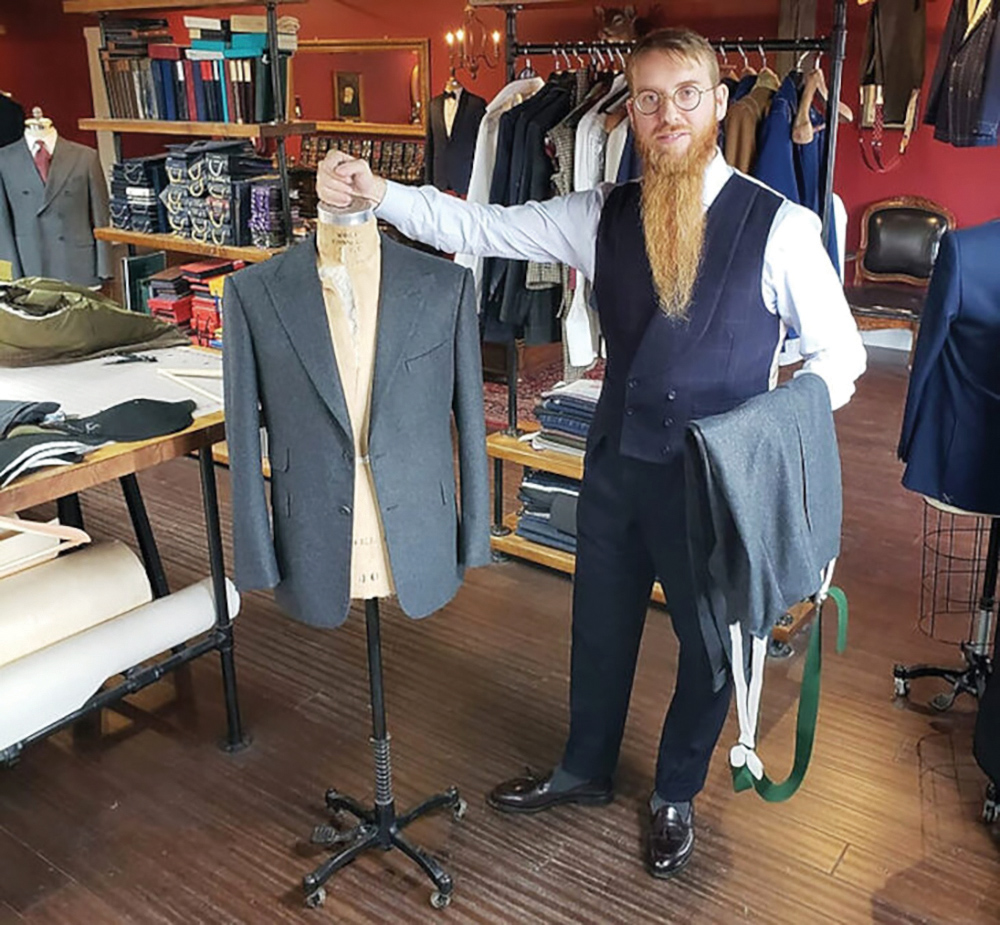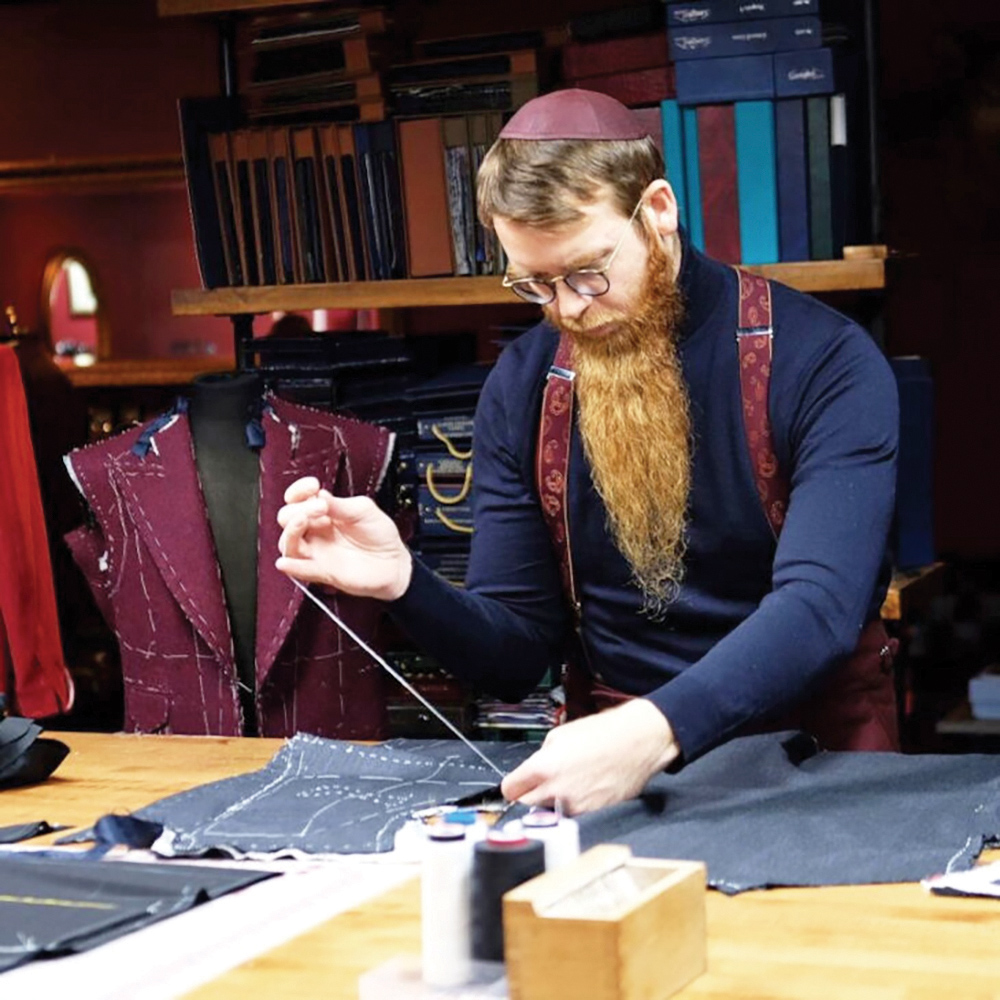By Kylie Ora Lobell
(Reprinted courtesy of Aish.com)
Rabbi Yosel Tiefenbrun has always loved clothing. He remembers being 9 years old and starting to care about what he wore and how he looked.
“I had a sense of respect for my clothing,” he said. “I enjoyed dressing up and finding interesting pieces and matching them. I had a passion for it.”
Growing up in a Chabad home, Tiefenbrun was encouraged to become a rabbi and an emissary to help bring Jews closer to their Judaism. While he was excited about this path, he also wanted to become a master tailor.
So, he devised a plan to become a rabbi and also become like Alexander McQueen, whose fashion designs he admired. McQueen had apprenticed on Savile Row, a street in central London that offered the highest-quality traditional bespoke tailoring for men in the world. Tiefenbrun was going to apprentice there, too.

“I was in an academy for two years under a master tailor on Savile Row,” he said. “I fell in love with men’s tailoring and realized it was so creative. The accomplishment of creating something from scratch is an amazing thing.”
After going through the tailoring course, Tiefenbrun got married and moved with his wife to Singapore to serve the Jewish community there. At the same time, he worked at Kevin Seah Bespoke and soon had his first child, a daughter.
When he was 28, he and his family moved back to Brooklyn, where he was born, and he opened up his own tailoring house, Tiefenbrun, in East Williamsburg. He quickly became a huge success, serving international clients and being featured in the New York Times, Fortune Magazine, GQ, the New York Post and Time Out London. He also created suits for the show “Madam Secretary.”
Tiefenbrun is popular on social media—he has 111,000 followers on Instagram and nearly 3,000 on Twitter. On his pages, he posts pictures of himself making clothing, hanging out with his wife and children, and showing off his designs for his clients. He is passionate about what he does because he believes that clothing transforms a person.
“When I make a garment for someone, I’m helping them feel empowered and confident,” Tiefenbrun said. “They will do extra kindness. Feeling better about yourself ends up being better for the people around you.”
Tiefenbrun is in a hip neighborhood in Brooklyn, and the tailor serves a diverse group of customers, from young people living nearby to people who fly him out to Dubai or other places around the world to make custom clothes. Though he won’t disclose his client list out of respect for his customers, he said that he’s worked with famous musicians and actors.

“These are people from all walks of life,” he said. “Jews, non-Jews, religious, not religious. I’m surrounded by incredible people.”
As an Orthodox Jew, Tiefenbrun has a long beard and covers his hair with a yarmulke and hat. But he also dresses differently than other religious Jewish men, who typically opt for white shirts and black suit jackets. Instead, he wears colorful clothing with interesting patterns, and sometimes completes his look with the perfect pair of suspenders.
“People are seeing someone religious doing something completely different,” he said. “It’s really special.”
Sometimes, his clients will ask him about Judaism, and he’ll gladly chat with them about it.
“I develop relationships with people,” he said. “We discuss Judaism. I’m visibly religious, but we’re also just like anybody else. We appreciate similar things no matter where we’re from. We’re human beings, and we have the same hobbies and interests and we connect over them.”
Tiefenbrun’s work directly ties into his Jewish values. There are many teachings about clothing, including the fact that you should never have a stain on your clothing or disrespect it in other ways.
“The Torah teaches us not to be wasteful,” he said. “We should cherish our clothing and make sure it lasts.”
To fulfill this mitzvah, Tiefenbrun urges people to opt for high-quality clothing, as opposed to “fast fashion”—cheaply made clothing that wears out easily.
“The way it’s made cheaply, it’s not respecting the cloth,” he said. “It doesn’t last long, and you throw it out very quickly. When you respect clothing, you will take it more seriously. You will take care of it more. You don’t have to necessarily spend a ton of money, but you do need to be more thoughtful when it comes to how you shop.”
The bottom line, Tiefenbrun said, is that it’s better to have a few beautiful, treasured items that you spend a little more money on rather than a bunch of cheap clothing you don’t really care about.
“If it’s made well, it will last a long time,” he said. “You’ll be more grateful and have an appreciation for it.”
As for Tiefenbrun, he’s grateful to be working in a career he enjoys and helping people feel more confident about themselves.
“I’m following my dreams,” he said. “I’m passionate about it, and I think that comes across.”










